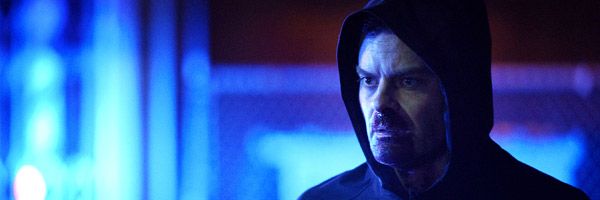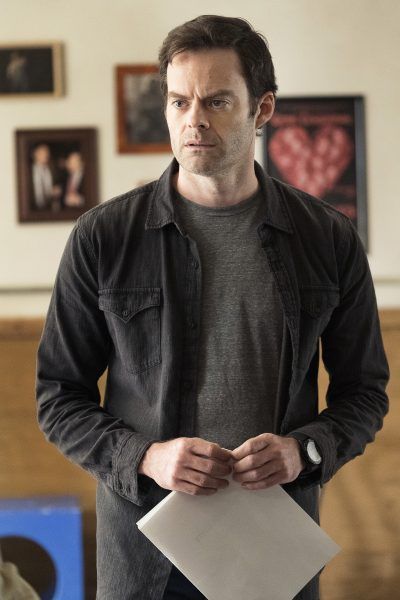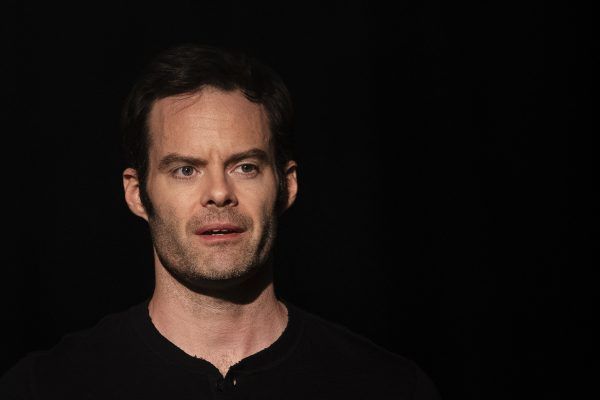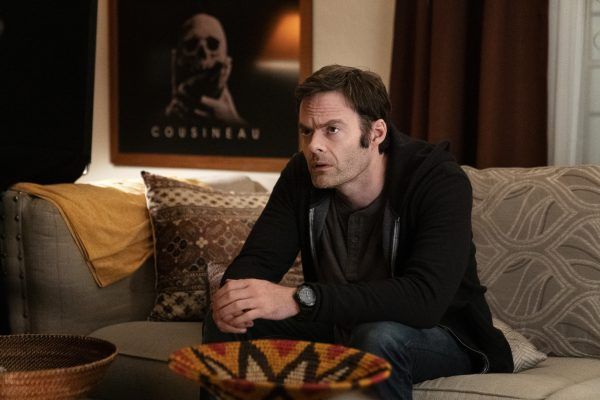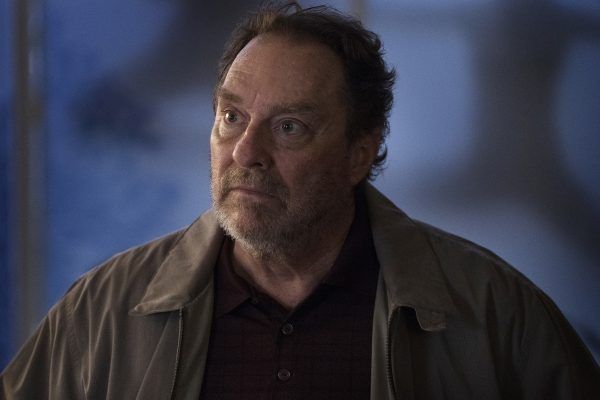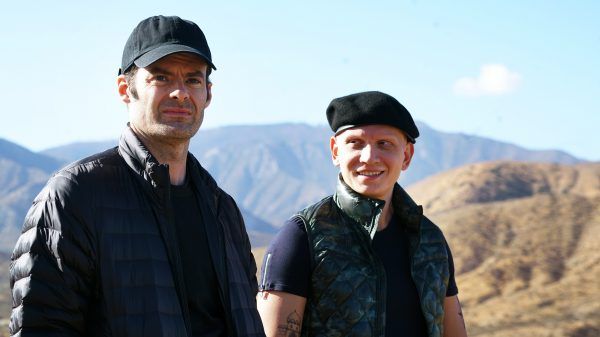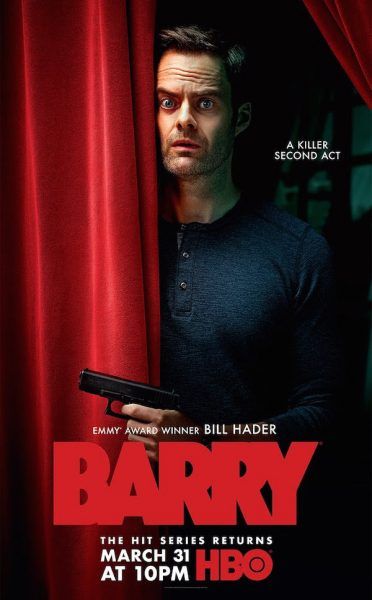Last year’s debut season of the new HBO comedy series Barry not only showcased Bill Hader’s talent as a performer (for which he won a Best Actor Emmy), but also as a director. The show’s pilot marked Hader’s directorial debut, and through the three episodes in total that he directed, it was clear he had a strong eye for shot-composition and motivated visual storytelling. But with Barry Season 2 Episode 5, Hader has really stretched his talent behind the camera, solidifying himself as a filmmaker with a skillset that is as multi-faceted as it is precise, resulting in a pure directing tour de force.
The fifth episode of Barry’s second season, titled “ronny/lilly”, is almost like a short-film—and indeed it was conceived and written differently than most of the show's other episodes.
During my extended interview with Hader about the making of the episode, he revealed the nugget of the idea was first planted during the making of Season 1, then while breaking the story on the second season, Hader went off and started writing this somewhat self-contained installment on his own, coming to co-writer and co-showrunner Alec Berg every now and then with new pages and running the work by the writers room at large. It also helped that Hader was writing this episode specifically knowing he was going to direct it, so he began mapping out the complex shots—like the oner—in the script phase.
It was a long and wide-ranging chat as I had a lot of questions about how Hader pulled this off, and I think both casual fans of the show and cinephiles alike will find his answers fascinating and insightful. And if this episode alone didn’t make you eager to see Hader write and direct a feature film, his comments here should do the trick.
Check out the full interview below.
Alright so let’s start at the beginning. Where did this episode come from?
BILL HADER: The way that came about was, last season Wade Allen, our stunt coordinator said, 'I have this young girl, Jessie, who's like 11 and she's amazing at karate and stuff. If you ever need a little girl in an episode, let me know.’ I went, 'Oh, that's interesting.' Then over the summer, I was in Vancouver shooting a movie called Noelle and I have a little book that I write ideas in, and I just had this thought of Barry in a house and this little girl in the karate gi and you think, 'Oh God, he's gonna have to kill this girl.' and then she lunges at him and beats the shit out of him.
Yeah (laughs).
HADER: And I was like, 'Okay, what if that happened?’ And then I had this image of her climbing up a tree and going onto a house. So, I have those two things that I wrote out. I go, 'I don't know where they go, but the idea of Fuches and Barry trying to get a kid into car, like she's like a lost dog and they can't get her in the car and then she climbs up a tree...' So, I just was trying to dance around these ideas and then when we started talking about season two, everyone was like, 'Well, what about Loach.' That was a big thing in the beginning of the season, when we started talking. Oh, Loach is gonna ask Barry to kill the guy that's sleeping with his ex-wife. That was like day one of writing.
Oh wow.
HADER: We had that. We put that on the board at the end of Episode 4 and then every scene with Fuches and everything was all written backwards, so we were kind of like setting up to pay off that moment.
Well, that tracks with the Loach reveal. I think you guys did a really great job of laying that groundwork.
HADER: Yeah. You think he's mad at Barry about Moss, but he really is mad about his ex. You could go back and watch it and go, 'Oh yeah. That's what he's talking about. That's his plan the whole time.' So, in thinking of that, I went, ‘Okay, so Barry doesn’t want to go kill the guy, but he has to go kill the guy. Oh wait, what if that guy's got the little girl in that house, from that other idea.’ So I sat down to write it and I remember Taofik Kolade, one of our writers—I was pitching it out and initially it opened with Barry entering the house and hiding in the house for the guy, and Tal was like, 'It should start with the guy coming home. Maybe we kind of know Barry's in the house, but we don’t know for sure.’ I'm like, 'Ooh, that's better.'
I went and I started writing that scene as you see it. The guy comes in. The window's open. He looks around. Barry, starts talking to him offscreen, then we do a reveal. He's dressed weird and then the guy goes, 'Yeah, I got a bag in there.' And he goes in to get the bag and then I just immediately thought, ‘What if he goes in there and it's filled with Tae Kwon Do trophies?’
(laughs)
HADER: It was one of those great moments of writing where you're just writing and then you go, 'Oh, it's filled with Tae Kwon Do trophies. Oh that's awesome.’ What would be the worst thing for Barry to see here? And it's like, oh, Tae Kwon Do trophies, and so then they get in a fight, and it was specified that that fight would be in one shot. He’s taking the nun chucks so this is gonna be a big kick-ass fight scene. What would be more interesting here? What if he just dies because his throat’s been crushed? (laughing)
So, I just remember writing the first fifteen pages in one kind of go, and laughing really hard and going, 'Oh, that's interesting.' And it ended with Ronny dying and then I remember showing that to Alec and he was like, 'This is crazy. I love that. And then what do you think happens?' I'm like, 'Well, I think he goes to leave and then a little girl is coming in from school and then that goes wrong. And then she escapes but she's hurt him somehow.’
Mostly these episodes, because we have so many plot lines and stuff, the writers room really helps. And this episode, I will say I wrote a lot of it on my own and then I would bring it to the room in script pages, not really written out on the big white board that much. It was kind of like, ‘Here's this scene and this scene.’ And I remember the thing that the room and Alec helped with was I pretty much wrote it as what you see in the episode, then Alec—and he was right—was like, ‘Fuches has to know about the monastery somehow. I think that needs to happen in Five.' So, Alec and I wrote that scene with him when they're waiting for her, after the stitches rip up, and Fuches finds out about the monastery.
Yeah. Yeah.
HADER: So we put that in, and then the other thing we came up with in the room was the idea of Fuches super-gluing his hands to the steering wheel. That came up in the room. Because I had her biting his face, and everyone was like, ‘Why wouldn't he just pull her off the face?’ And then we were like, 'Oh. The stitches. What if we used superglue on the stitches and he super-glues his hands to the steering wheel?’ And everyone laughed. There was not a lot of “room writing” on this episode. It was mostly me writing stuff and going, ‘Alec does this track for you?’ and him going ‘Yeah! That looks great!’ And the only thing was he was like, ‘How do we get some of our story in there, somehow, just to keep it alive?’
It feels like a short film almost.
HADER: Yeah. That was what was fun about it. We were like, let's just make a thing that's just kind of it's own thing. And to be honest, it was something where I wanted to direct something like this. So it was coming up with these ideas knowing that I was gonna direct it. So a lot of things, like the tree shot or the long fight scene or even moments like when they're in the car and the camera’s locked off the back and then they just start driving, I knew how I wanted to shoot them when I wrote them. All that stuff was in the script where I saw it a very specific way, so this definitely was an episode that was largely in my head, and then I was having to try to communicate it to people.
And some of my ideas were not good and I got rid of them in the script phase. Paula Huidobro, our DP, had a great note. Initially, the fight scene that's in the house, I wanted a camera to follow them the entire time and she said, 'What if they wiped out of frame and then we just slowly land on them?' And I'm like, 'Oh, that's way more interesting.' So, there's always things like that. It’s not all me.
For sure. But still, I mean the directing in this—and I genuinely mean this—is so incredibly good. You killed it.
HADER: Thanks man. It was a fun episode. It was fun to do. It was a lot of work and a lot of visual effects. There's tons of visual effects in that episode.
I've seen a lot of movies and I've seen a lot of oners and I'm pretty good at noticing like multiple shots that were edited together, but I genuinely couldn't tell—was that oner actually a oner captured in camera? Is there a cut in there?
HADER: It's two takes combined. We did it all as a oner but we liked the top of one and the bottom of another one. We liked the first half of take four and the second half of take 3. We did four takes. So there’s a stitch.
Well, I couldn't see it. Were you looking to any oners for reference? I mean the style of that oner felt Spielbergian to me a little bit, in that Spielberg's oners aren’t incredibly showy. They're very story and character focused.
HADER: Yeah. I'm getting shit about it because I mentioned it in that New Yorker article, but I was watching a lot of Polish movies and those Andrzej Wajda movies and Polanski and people like that. The camera movements are always very motivated. So, it's just making sure it was motivated but, at the same time, by slowing it down and letting them go out of frame and then going and finding them adds a little bit more mystery. It's less action and more, kind of, observing. I just wanted a very slow camera. I just wanted to design these shots where it all is kind of uniform. For some reason, that felt right. I don't know why. When Paula was like, 'Let's try it,’ where they cross out of the bathroom and then the camera slowly finds them, I was like, ‘Oh that looks really cool. They can vanish and we don't know what's happening.’ That felt more in that kind of Wajda-Polanski work. But I also like the idea of doing a fight scene where—I didn't want it to be rad. I wanted everyone to get really tired, fast.
Everyone gets their asses kicked.
HADER: Yeah. Everyone gets beat up but it just goes on. It's stupid and tired.
He's telling him his windpipe is crushed and he's like ‘No don't get up. Your windpipe is crushed. Sit down.’
HADER: Yeah. He's like ‘Ronny, your windpipe's crushed. Stop.’ But he's still trying to be an action hero and it's like no.
It’s so exhausting and you're like ‘Man, Barry's really beaten up,’ and then the girl comes in and she's in the Tae Kwon Do outfit and you're like ‘Oh shit.’
HADER: Yeah. Then she starts flying all over the place.
Like a spider monkey.
HADER: Yeah. I like it when's she flips over the fence and stuff.
Was that an Edgar Wright nod there?
HADER: No. No. It is very much an Edgar Wright thought, but no, she just needed to jump over the fence.
It's one thing to say, ‘Alright I'm doing an action sequence,’ but this is essentially one long sustained set piece with a bunch of mini set pieces in it, but you're following Barry through the action as it goes throughout the episode. What's it like constructing that as a director?
HADER: It's a lot of fun. There's a lot of moving parts but I find it incredibly satisfying and fun. I love working with the stunt coordinator. I love working with my DP. I love working with the production designer. And the guy who deserves a ton of credit on this episode is my first AD, a guy name Gavin Kleintop, who is just the man. And Gavin had such a good attitude. He's so funny and he totally got it. He would come to my apartment and we would have an overhead of all the sets and I would just go, ‘Okay, what I'm thinking is he enters here and we pan across, he opens his door...’ I think that's a very Spielberg shot, by the way. When Ronny enters the house and you see his silhouette on the wall.
Oh yeah.
HADER: That to me feels right. But you see the silhouette and you reveal the window. You're just giving information.
Yeah that Spielberg mode of no shot wasted.
HADER: Yeah. We got that information down, now we're just entering his apartment, him entering this room, okay I'm gonna do a fight scene in this room so I just want to do the geography of this as the whole room. And then, when I'm talking I don't want to see me, I just want it to be on this guy's face. You just hear me off camera and Gavin said, 'Why?' And I go, 'I don't know.' (laughing) I just want to hear it. I'm learning to just trust your instincts and go, 'I don't know why, but this just feels right.' You don't see me and then when I enter into the frame, and you see how I look, it gets a laugh. But that shot was really difficult because you have to hold on him, and then I come in, and then I wanted to take me to the window, and then we go into the overs from me and Ronny. That was a tough one for operating. They're holding on him and then when I go over they do a slight pan dolly with me. That's a tough shot for an operator.
So Gavin and I we just walked through it and, like you said, he's trying to make sure none of the shots are wasted. You don't have a lot of time. Then I went and photoboarded the entire episode, because to shoot a thing like that in the amount of time we had, I had to photoboard. I couldn't just say, 'Ah. We'll see when we get there.' I had to have a very clear view for my crew and the DP and the people doing background and everybody. I had no time to fuck around. So that was how we approached it and it's nice because you do go back to the photoboards and you go, 'Oh yeah. We used everything.' Because while you're doing the photoboards you can look at them and then say, 'You know what, we don't need that shot or that shot, we can just shoot this. I, actually, can cut right from here to here and lose this, this and this.’ It was just making sure that we can just come together with all of this stuff and make it make sense somehow. That's all. You're just trying to tell a story as simply as possible. One of the things I always liked about one of those Polish movies I was watching, some older films that I like, is just the simplicity of the coverage.
Yeah.
HADER: Paula and I talk about that a lot. It's just like, how many steps do we actually need to tell this?
Well, that's one of the things that I really appreciate about Spielberg as a filmmaker who knows exactly what he wants when he gets to set and shoots only what he needs.
HADER: Yeah. He's also really good at that. I've watched him work; he can do that on his feet and do it really fast. And he has a crew that's crazy fast and good. I'm always like, how do you do that? One day, that's my goal. I want to get to that good. But for right now I'm like, you know what, I'm gonna have to photoboard this thing.
I'm telling you, man, I was watching this episode and as I was watching it I was thinking, ‘Oh shit, Bill Hader would make a really great horror movie,’ and then I was like, ‘Oh no, he'd make a really great action movie,’ and then I was like, ‘No, I think he could probably make a really great movie period.’
HADER: Thanks man. That's all I wanted to do my whole life. It's a cool thing to—it's like that tree shot where the girl climbs up the tree. Anybody else would just cover it. They would pop in. You know, you get talked into stuff a lot. Where people are like, ‘Don't you want to go in? That's what everybody would do.’ and I’m like, ‘No stay here.’ And so much of it is getting people's trust that you know what you're doing. It's like Spielberg can walk on the set and he's Steven Spielberg, so if he's like, ‘No I'm gonna do this all in one,’ they go ‘Okay.’
Yeah.
HADER: It’s because you have a reputation. I've experienced it in comedy where I will walk out and be like, 'Hey I'm Bill.' and people just start laughing because they just immediately prime where they're like, ‘Oh he's funny.’ I think on this episode, because I directed some of the first season, they were much more open to these ideas that I had. Where I was like, ‘I want to do this all in one and I want to do this this way. We're gonna have to build the interior of this house.’ I mean the look on everyone's face—because we found a house that had a tree, and I said, ‘But the tree is wrong. It just won't look right.’ And then my producer Aida was like, ‘You want a house like this?’ and pointed to that house. ‘It would just be great if there was a tree there,’ and I'm like, ‘Oh, we'll build a tree.’ Then everyone just stared at me. (laughing) And I’m like, ‘No, no we're gonna build a tree, it'll be great.’
That's funny.
HADER: And then the other thing we had to do in that episode, just to give it some emotional resonance, was to have those flashbacks of him in the desert. You don't think about it while you're writing, but the desert is this place that's in the show a lot this season and last season too. It has a weird representation of this kind of arid place where things can't grow and it's where he does a lot of his violent stuff. So then it was like, 'Oh, well he's coming home and coming back to this person that represents that.’ Again, the visual effects were great. Those shots in the background, there's houses and stuff back there and the effects took it all out.
That's crazy.
HADER: They fully gave me a haircut so I look like my head is shaved. That's all visual effects.
That's insane. I was just assuming that you shot it at the end of the shoot.
HADER: No. All of the episodes with my hair cut, that's all visual affects.
Wow.
HADER: It's insane, yeah. And then the tree is a visual effect. So, the tree isn't actually there. It's like this little rock climbing wall with an arm on it, so the little girl just goes up like a green screen rock climbing wall with an arm on it and then she goes up that and jumps off and then visual effects built a tree.
That's really cool. Yeah. I was gonna ask what it was like to channel Terrence Malick with the desert scenes.
HADER: Yeah that's the full on Malick Days of Heaven thing.
I wanted to ask how did the decision come about to use “How Do I Live?” in the supermarket?
HADER: That's Jeff Buchanan, my editor. Initially it was a Celine Dion song and then Jeff was like, ‘We can't clear the Celine Dion song, so I'm gonna find something else.’ And that's why it's in there. (laughing) It's solely Jeff my editor.
It’s so funny, and so much of this episode is really funny, and it’s that thing you talk about where it’s all causal. The stitches break, therefore Fuches uses superglue, therefore his hands are superglued to the wheel, therefore he can't drive away, and I love how it just all kind of snowballs. And that karate kick into just nothingness when he's trying to hit Barry in the supermarket.
HADER: Yeah. Where he misses and that's like the Blake Edwards shot, I call it. And also our Blues Brothers shot, which is when he backs into the police car. When we lined that up me and Alec were like, ‘This is such a Blues Brothers shot.’ (laughing)
It's great. And then you ended, as you say, on an emotional note. I think you threaded this kind of dueling fathers thing throughout the season really well, because he gets to Fuches and Fuches is like, ‘Get in the car, Barry. What are you doing? Obviously, come with me,’ and he's just considering, in this daydream state, Fuches is the one that's there. He's coming home to Fuches and it's really sad.
HADER: Yeah. He's starting to realize that this might not be good for him because people are just using him, and he's like all messed up. He's hurt and he's like, ‘Alright, up you go. Go get her.’ He doesn't care about Barry's well-being and I think Barry's figuring that out.
Yeah. I really like the shot composition there and then the sound design in this episode is really outstanding.
HADER: Oh my God yeah. Those guys did a phenomenal job and it was so much fun. The mix for this took forever but it was fun when we were in the mixing stages on this. Just coming up with different sounds and everyone laughs really hard when she's throwing stuff at me and I'm behind the counter and then she hits me in the face with that soup can. I go, 'Oooh.' Almost that entire fight scene is ADR. All the fight scenes are ADR.
Oh, wow.
HADER: So, there's very funny things of that. We brought Jessie and Daniel, who plays Ronny, back and we would just play them the scene and they just go, 'Oh, Ah, Ugh.' (laughing) And I came in and did it. There's a guy named Jake, who's my stunt double. He's doing a lot of that stuff, especially the fight with Ronny. And that's me just MST3K’ing it. (laughing)
Barry airs on HBO on Sunday nights. If you missed my previous episode-specific breakdowns with Hader, check them out below.
- Bill Hader Breaks Down the ‘Barry’ Season Premiere
- Bill Hader on ‘Barry’ Season 2 Episode 2, That Ending, and Hiro Murai
- Bill Hader on ‘Barry’ Season 2 Episode 3 and Not Having a Master Plan
- Bill Hader on 'Barry' Season 2 Episode 4 and Ensuring Sally's Story Rings True

